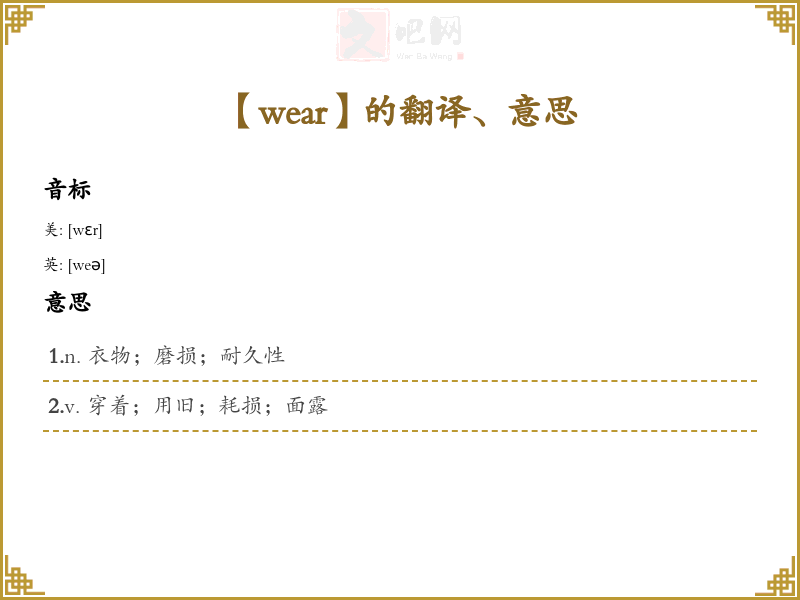【wear】的翻译、意思
时间: 2025-01-11 02:53:47
【wear】怎么读
美:[wɛr]
英:[weə]
【wear】是什么意思、字义解释
1. n. 衣物;磨损;耐久性
2. v. 穿着;用旧;耗损;面露
【wear】的详细解释
英文单词学*与分析:[wear]
1. 基本定义:
- 字面意思:Wear 指穿戴、使用或磨损某物。清晰的定义为“将衣物或饰品等放在身体上”。
- 词性:动词(verb)、名词(noun)
2. 词源与起源:
-
词源分析:Wear 源自古英语“werian”,意为“穿着”。词根“wear”与“worn”在历史上都与穿戴和磨损有关。
-
历史背景:Wear 的首次使用可以追溯到公元前12世纪的古英语文献,表明人类在社会生活中对穿衣服的需求。
-
课本:
- **教材:通常在初中英语教材中出现,适合7-9年级学生。
- 牛津教材:小学阶段和初中阶段均有涉及。
- 美国教材:在小学及中学的英语课程中广泛使用。
3. 使用场景:
-
正式与非正式语境:
- 正式:在商务场合中,使用 wear 可能涉及职业着装标准,例如:“Employees are required to wear business attire.”(员工需要穿着职业装。)
- 非正式:在日常对话中,常用于谈论个人风格,例如:“What are you going to wear to the party?”(你打算穿什么去派对?)
-
特殊场合:
- 法律:在法律文献中,wear 可能涉及到衣物或装备的使用,例如:“The defendant was wearing a jacket at the time of the incident.”(被告在**发生时穿着一件夹克。)
- 艺术:在绘画或摄影中,wear 可用于描述人物的服装和风格,例如:“The artist captured the wear of the fabric beautifully.”(艺术家完美地捕捉了布料的磨损感。)
4. 示例句子:
-
She likes to wear bright colors in the summer.
她喜欢在夏天穿鲜艳的颜色。 -
I usually wear glasses when I read.
我通常在阅读时戴眼镜。 -
The shoes are starting to wear out after months of use.
这些鞋子在几个月的使用后开始磨损。 -
You should wear a coat because it’s cold outside.
你应该穿上外套,因为外面很冷。 -
He wore a smile on his face during the ceremony.
他在仪式上面带微笑。
*. The dress she wore to the event was stunning.
她在活动中穿的裙子令人惊艳。
-
They wore matching outfits for the family photo.
他们为家庭照片穿了相配的服装。 -
The children were wearing costumes for Halloween.
孩子们在万圣节穿着戏服。 -
She wore her hair in a bun for the party.
她在派对上把头发盘成了一个发髻。 -
He always wears a watch when he goes out.
他出门时总是戴着手表。
5. 同义词与反义词:
-
同义词:
- Don: 通常指穿着,尤其是正装。
- Dress: 指穿上衣物,通常用于女性服装。
- Adorn: 指装饰,强调装饰性穿戴。
-
反义词:
- Remove: 意思是“脱掉”,与 wear 相反。
- Discard: 指丢弃、抛掉,不再使用。
. 学方法:
- 音标记忆法:掌握 /wɛr/ 的发音,通过重复朗读帮助记忆。
- 谐音联想记忆:将 wear 联想为“我在穿”,帮助记忆其含义。
7. 关联词汇:
- 频率高的关联词汇:
- Clothes(衣服)
- Outfit(服装)
- Dress(裙子)
- Shoes(鞋子)
- Accessories(配饰)
通过以上分析,可以更全面地理解和运用单词“wear”。
【wear】例句
1、[V-T] When you wear something such as clothes, shoes, or jewelry, you have them on your body or on part of your body. 穿; 戴
例:He was wearing a brown uniform.他穿着一件棕色制服。
例:I sometimes wear contact lenses.我有时候戴隐形眼镜。
2、[V-T] If you wear your hair or beard in a particular way, you have it cut or styled in that way. 留着 (某种样式的头发或胡须)
例:She wore her hair in a long braid.她留着长辫子。
3、[N-UNCOUNT] You use wear to refer to clothes that are suitable for a certain time or place. For example, evening wear is clothes suitable for the evening. (在特定时间或场合穿戴的) 服装
例:The shop stocks an extensive range of beach wear.这家商店备有品种繁多的沙滩服装。
4、[N-UNCOUNT] Wear is the amount or type of use that something has over a period of time. 耐用性; 经久性
例:You'll get more wear out of a hat if you choose one in a neutral colour.如果选择中性颜色的帽子,戴的时间会更久一些。
5、[N-UNCOUNT] Wear is the damage or change that is caused by something being used a lot or for a long time. 磨损
例:...a large, well-upholstered armchair which showed signs of wear.…一张宽大、装饰精美的有些磨损的扶手椅。
6、[V-I] If something wears, it becomes thinner or weaker because it is constantly being used over a long period of time. 磨损
例:The stone steps, dating back to 1855, are beginning to wear.这些可以追溯到1855年的石阶开始出现磨损。
7、[V-I] You can use wear to talk about how well something lasts over a period of time. For example, if something wears well, it still seems quite new or useful after a long time or a lot of use. 耐用
例:Ten years on, the original concept was wearing well.十年过去,最初的观念依然适用。
